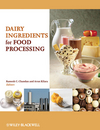Market Shifts in Dairy Alternatives
Interest in plant-based foods, drinks pushes change in dairy-free alternatives






Mooo-ve over cows! It used to be that only those consumers with dairy allergies or intolerances looked to dairy-free alternative products. Today, more consumers are considering healthy lifestyle choices and generating greater interest in new lactose-free, dairy-free and plant-based/vegan options.

Also fueling category growth are the sheer numbers of creative plant-based options to traditional dairy lines. New dairy-alternative offerings primarily have targeted beverage applications. Yet today there are many more non-dairy food offerings including cultured products (such as yogurt), frozen desserts and ice cream, creamers and cheese.
For the record, the dairy alternatives category continues to be led by beverages. Dairy alternative drinks accounted for 7% of global dairy launches recorded by Innova Market Insights during the 12 months ending in October 2016. Those dairy alternative launches are up from 5.7% of the total dairy new products total during the previous 12-month period. Actual global dairy alternative launches have more than doubled over a five-year period.
Innova Market Insights finds new dairy alternatives popping up from increasing variety of non-soy, plant-based alternatives—including cereal grains such as rice, oats and barley; and nuts, such as almonds, hazelnuts, cashews, walnuts and macadamias. There also are more unusual ingredient alternatives such as hemp and flaxseed. New retail dairy alternatives also are appearing in increasingly sophisticated flavors as well as blends of non-dairy milks from different sources. Not surprisingly, Innova Market Insights even reports more non-dairy alternatives replacing milk in fashionable milk-based coffee drinks.
Drink Up!
Although the dairy alternative drinks market in the US is less developed than that in Asia, it is fairly well established, with launches accounting for 7.5% of dairy introductions in the 12 months to the end of October 2016, up from 6.6% in the previous year. More recently, the US dairy alternatives market has changed radically in that soy—the initial and dominant replacement ingredient—has given way to alternatives such as almond and coconut.
The US is notable as the first country to see almond milk rise to popularity, with sales up from virtually zero in the mid-2000s to more than US $1 billion in 2016 for chilled almond milks distributed through multiple distribution outlets. Almond overtook soy as the leading non-dairy beverage option some years ago and is continuing to see growth, albeit at a lower rate than in some previous years. By comparison, annual sales of chilled soy milk through multiple retailers have stalled, down more than 10% in 2016 to about US$265 million.
A closer look at retail sales data show WhiteWave’s Silk is the leading brand, followed by Blue Diamond’s Almond Breeze and Califia Farms. Retailers’ private label brands also are strong dairy alternative market contenders.
It certainly was significant last year when Danone, a more traditional, dairy-based company, purchased WhiteWave. WhiteWave’s dairy-free brands not only include Silk, but also So Delicious and Alpro. Going forward, the deal presents Danone with numerous opportunities to further develop its interests in the market in both North America and Europe.
WhiteWave’s Silk is North America’s leading plant-based beverage brand with a portfolio encompassing soy milk, almond milk, coconut milk and cashew milk, as well as dairy-free yogurt alternatives and creamers. Recent product activity included the 2016 launch of Nutchello, a line of “break-time” beverages with a blend of nut flavors. Silk also sponsored a plant-based promotion called “Do Plants.” It featured tennis star Venus Williams and music producer/social media personality DJ Khaled.
WhiteWave’s So Delicious Dairy Free brand of milks, creamers, desserts and cultured products also has been successful. Meanwhile, WhiteWave’s Vega brand has been a key driver in the North American plant-based food and nutrition category with protein and nutritional shakes, a sports nutrition system, supplements and snack bars. WhiteWave acquired Vega in June 2015 and then purchased Wallaby yogurt just a few months later.
WhiteWave’s Alpro brand has been driving Europe’s plant-based beverages market. It was 2012 when the brand started extending soy milk. Today, its line includes almond, hazelnut, coconut, cashew, rice and oat milks. In the UK, one of its strongest markets, it is the leading free-from brand overall, with sales posting double-digit growth to more than GB£150m in 2016. In 2015, it overtook second-placed Müller Wiseman’s Black & White to become the number two UK fresh milk brand overall, with sales now standing at more than GB£100m a year. It also is developing its single-serve on-the-go options, with 2016 launches including Alpro Fusion soy and coconut drinks; and Alpro Go On, a high-protein alternative to Greek-style and other strained yogurts. Last but not least, Alpro also introduced an ice cream alternative in the second half of the year.
Back in the US, Califia Farms remains one of WhiteWave’s leading dairy alternative drink rivals. Founded in 2010, the company now has a portfolio of premium plant-based almond milks, coffee creamers and ready-to-drink cold brew coffees. It launched more than 25 products in 2015 and followed this up in 2016 with introductions such as Matcha and Ginger varieties in its Almondmilk range; a nut-based half-and-half creamer alternative under the Better Half Creamer name; its CaliCoco coconut-based smoothie, a Black and White unsweetened coffee drink with almond milk and a Full Shot vegan protein drink. It also introduced a Barista Blend almond milk for specialty coffee houses and, more recently, its Nitro Cold Brew, claimed to be first completely dairy-free, nitro-infused, cold brew coffee latte.
Another key market competitor is Hain Celestial with its Dream beverages, yogurts and frozen dessert options. Its dairy-free beverages include Rice, Almond, Soy, Coconut and Cashew varieties and in 2016, it also introduced a Dream Boosted line in Coconut and Almond options. These offerings are designed to balance nutrition and taste and come “boosted” with camu camu, flax and chia seed oils and pea protein. It’s marketed as an ideal smoothie base.
Increased market competition also has led to more complex flavors. Consider Bolthouse Farms’ Blueberry Banana Almond Milk or Hain BluePrint Inc.’s Organic Cashew Blueberry Boom with blueberries, dates, cinnamon and vanilla. Still more intriguing options include Rawpothecary’s Green Warrior with hemp seeds, kale, spinach, banana, date, maca and coconut water; Trader Joe’s seasonal Pumpkin Spice almond milk; and Rebel Kitchen’s dairy-free Mylk range in Chai, Coffee and Chocolate varieties.
Edible Options
Alongside the relatively well-developed beverages market, other dairy alternatives are appearing, often using established dairy-free brands. In addition to its Plain and Vanilla flavors, WhiteWave’s Silk has a range of fruit-flavored yogurt alternatives based on soy. Its So Delicious brand also has coconut-milk-based yogurt alternatives and a range of coconut-based frozen desserts and toppings. For its part, Hain also offers Dream yogurt and ice cream alternatives (tubs, bites, bars and other novelties) made with almond and coconut.
Another long established competitor in the alternative dairy alternatives market is Tofutti Brands Inc. Its line includes cheeses and spreads, desserts and prepared foods (pizza, blintzes). It continued to extend its frozen dessert range in mid-2016 with the launch of a special edition Mint Laced with Belgian Chocolate variety. Despite strong growth and relatively high levels of new product activity, these sectors remain relatively undeveloped by comparison with dairy-free beverages.
More recently, the cheese market has seen more dairy free alternatives, particularly those positioned as vegan friendly. These tend to be from specialist brands, such as Daiya Foods Inc., which started producing plant-based cheeses in 2009 with the launch of Cheddar Style and Mozzarella Style Shreds. Its range has since expanded but still focuses on cheese with shreds, slices, blocks and cream cheese. Daiya has expanded to market pizza, Cheezcake, Cheezy Mac, Greek yogurt and dressings. Recent launches recorded by Innova Market Insights include Provolone and Cheddar Style Slices, as well as reformulated Swiss Style Slices, all using the “Deliciously Dairy Free” tagline.
Other launches in 2016 included Galaxy Nutritional Foods’ Go Veggie Vegan Cream Cheese Alternative in a strawberry flavor. The range is claimed to be the first vegan cream cheese alternative to gain Non-GMO Project verification and—like all items in the Go Veggie range—it is marketed as lower in calories and fat, higher in calcium and with equivalent protein levels to standard cheese. Galaxy also offers lactose-free and lactose- and soy-free products. Another vegan option launched in early 2016 was its Cheddar Singles product.
One interesting newcomer is Lyrical Foods, whose Kite Hill business uses almonds to produce cream cheese style products with traditional artisan production techniques. Last year saw Kite Hill add Original Soft Fresh, Ricotta and Truffle, Dill & Chive varieties. The company also makes almond milk yogurts in same vein, focusing on natural, high quality and local ingredients.
Consumers are increasingly choosing dairy-free options, which also usually are vegan-friendly. In the big picture, there certainly are a variety of consumer purchase motivations but the overall effect has been a rise in the number of dairy alternative products and brands on the market. Moreover, there’s an up-and-coming new wave of products with more than one type of alternative milks—such as almond and coconut, or rice and oat. As mentioned, there also are a greater variety of ingredients used in today’s dairy alternative offerings. Besides almonds, there’s been greater use of cashew and macadamia nuts moving toward the mainstream. Even more options, such as flaxseed, hemp and even lupin seed, are not far behind.
Originally appeared in the February, 2017 issue of Prepared Foods as Market Mooo-vers.
Old Meets New: Classic Cocktails With Non-Dairy, Vegan Appeal
 John Dye, owner of Milwaukee’s Bryant’s Cocktail Lounge, uses Rich’s Café Whip coconut milk to make a vegan Brandy Alexander.
John Dye, owner of Milwaukee’s Bryant’s Cocktail Lounge, uses Rich’s Café Whip coconut milk to make a vegan Brandy Alexander.
Last summer saw Rich Products Corp., Buffalo, N.Y., host a “Trend to Table” event for industry media. The two-day event featured market researchers and chef experts who discussed consumer and operator trends—and linked those trends to Rich’s diverse line of frozen bakery foods and non-dairy products.
One expert presenter was John Dye, the owner and mixologist at Bryant’s Cocktail Lounge in Milwaukee, Wis. Dye demonstrated how he makes two popular drinks—Crescent City Fizz and a Brandy Alexander—using Rich’s new Café Whip, a new dairy alternative whipped topping made with coconut milk.
Rich’s says Café Whip has a light and creamy texture with dairy and vanilla flavors with a hint of coconut. It meets vegan requirements and also is kosher pareve. It contains sugar instead of high-fructose corn syrup and has no hydrogenated oils. It also contains less fat than sweetened-and-flavored heavy whipping cream.
“Café Whip is the first viable dairy-alternative whipped topping to be made using coconut milk, which is great news for coffee shops, bakery cafés and other foodservice operations that are looking for the next edge in beverage solutions,” says Jeff Malchoff, senior marketing manager in Rich’s Foodservice Division. “This is a product that came about by listening to both the customer and the consumer. We learned that operators were trying to make a whipped topping using their current coconut milk but were not successful. With Café Whip, we believe the increased market potential is there for any foodservice operator who has a specialty beverage program.”
Looking for a reprint of this article?
From high-res PDFs to custom plaques, order your copy today!












